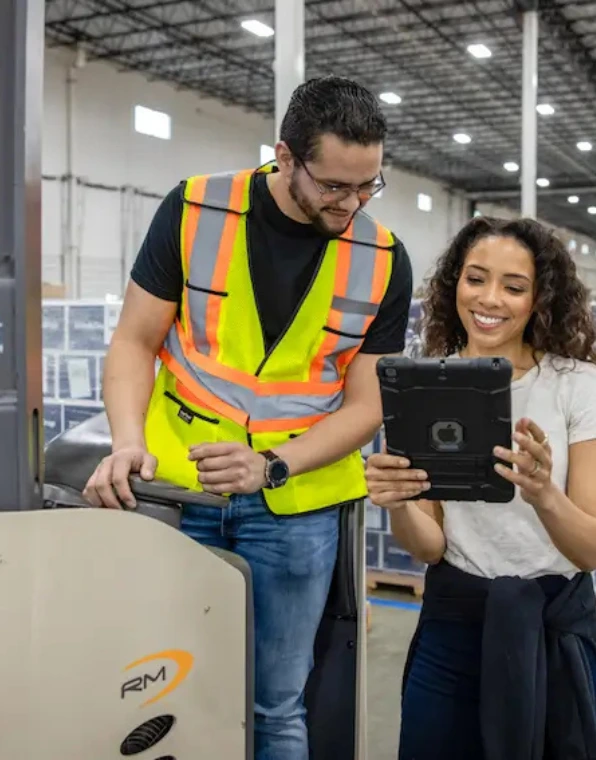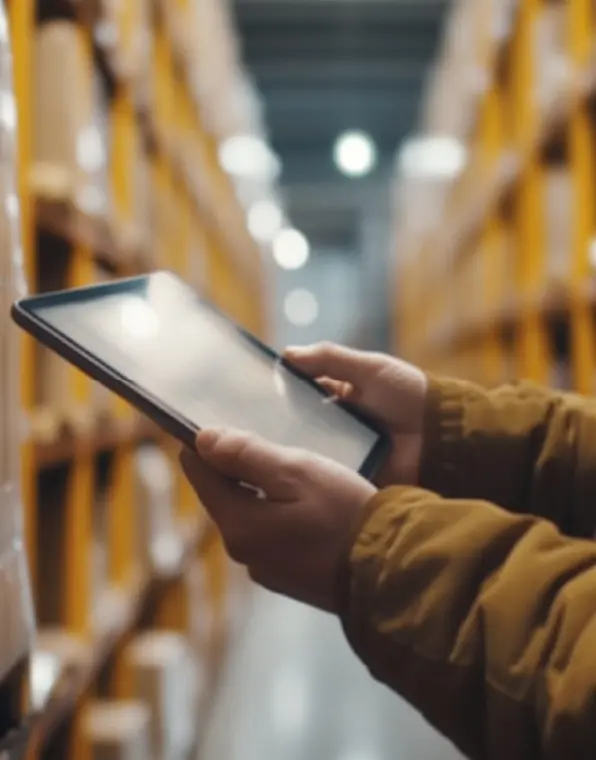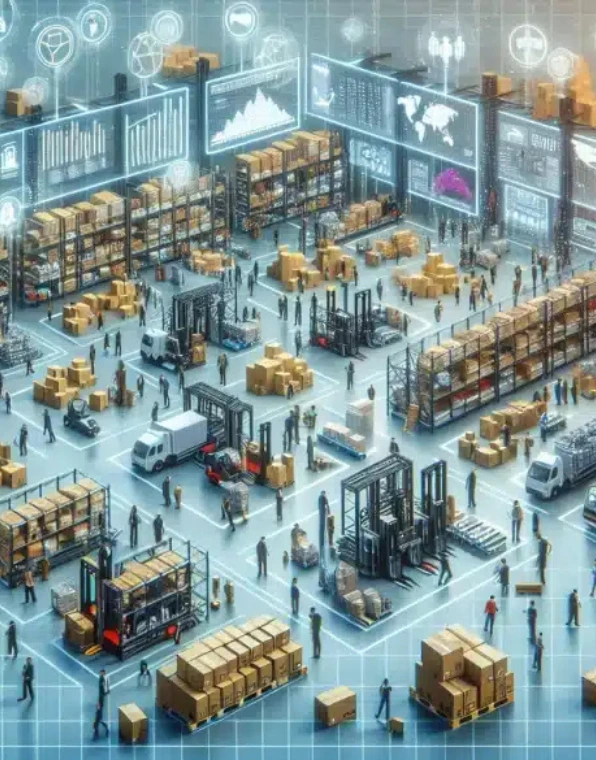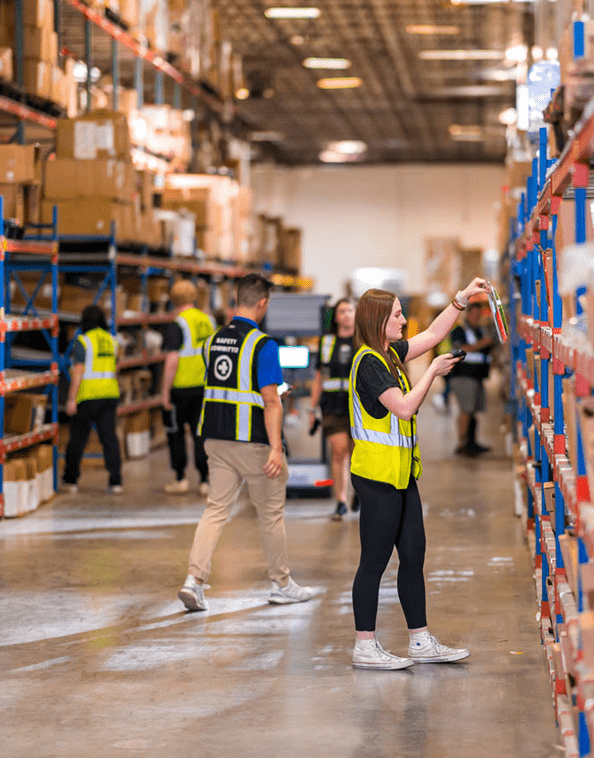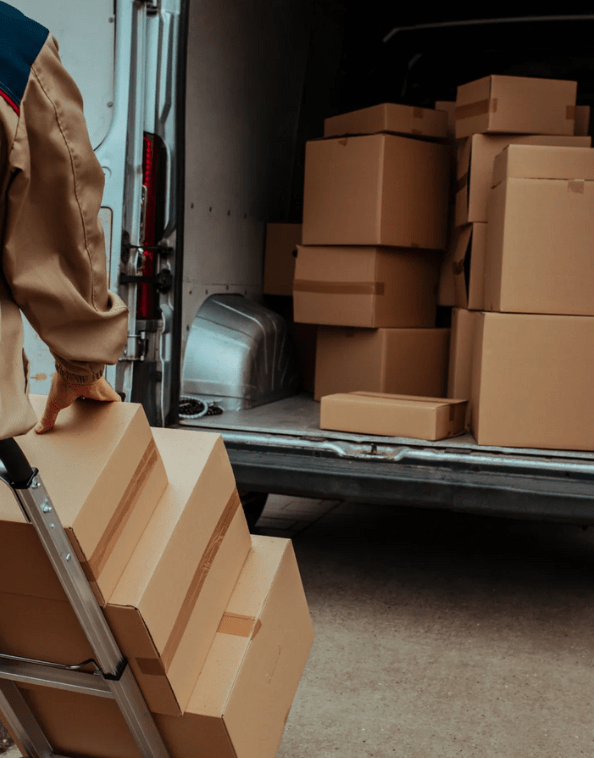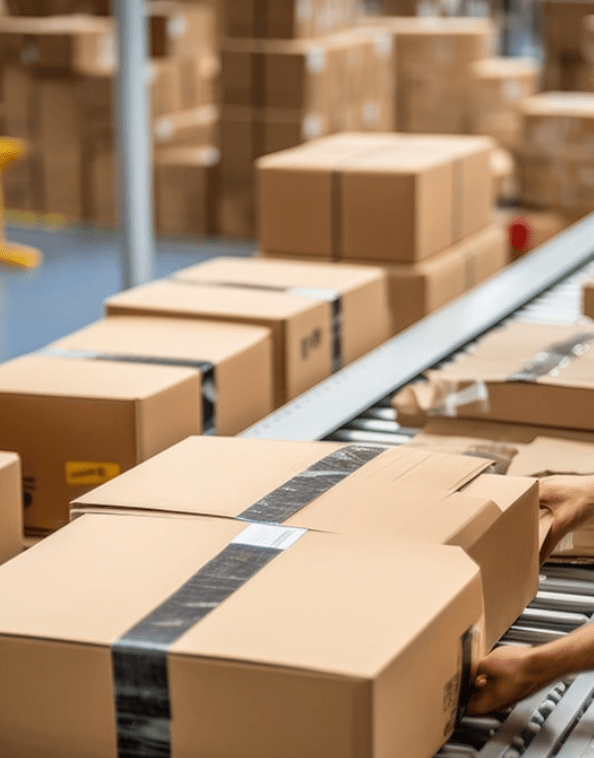B2B commerce is no longer optional for growing eCommerce brands. In fact, B2B channels now drive the majority of online retail volume, from wholesale and distribution to major marketplace and retail partners. Yet despite this opportunity, many brands struggle to fully capitalize on it because B2B comes with strict requirements, operational complexity, and high penalties for mistakes.
This is exactly where 3PL B2B fulfillment partners step in. The right logistics provider can help brands streamline inventory, reduce vendor-related compliance issues, and accelerate entry into new retail and wholesale channels.
With dedicated fulfillment centers in Florida, Tennessee, and the Midwest, FulfillMe supports brands looking to expand B2B distribution without sacrificing accuracy, speed, or compliance.
Below, we’ll break down why B2B channels matter so much right now, what challenges brands face, and how 3PLs like FulfillMe empower businesses to grow strategically—without overwhelming internal teams.
Why B2B Matters More Than Ever for Growing Brands
eCommerce growth has traditionally focused on direct-to-consumer sales, but the market has shifted dramatically. More brands are selling into:
Major retailers
Online marketplaces
Wholesale distributors
Brick-and-mortar chains
Specialized vertical retailers
This shift is happening because retail partners give brands access to larger purchase orders, broader visibility, and consistent recurring demand.
The B2B Growth Opportunity
Brands entering B2B channels gain:
Larger order volumes
Predictable revenue cycles
Access to audiences they can’t reach alone
Multichannel exposure
Higher lifetime value per customer
But the opportunity comes with operational challenges. Retailers require strict packaging, labeling, inventory accuracy, and routing guide compliance. Getting these requirements wrong can result in fees, delays, or even removal from retail programs.
That’s why B2B success requires both strong operational systems and deep fulfillment expertise.
Why Many Brands Struggle to Execute B2B Internally
B2B is profitable, but it’s not simple. Brands expanding into B2B quickly discover that the operational load grows exponentially.
Here are the most common challenges.
1. Inventory Visibility and Synchronization Problems
Without real-time data, even well-organized brands struggle to:
Allocate inventory across multiple channels
Prevent oversells and stockouts
Maintain accurate availability as B2B orders surge
Share accurate inventory feeds with retail partners
As B2B order volume increases, manual inventory management simply can’t keep up.
FulfillMe’s platform centralizes inventory across all channels—retail, wholesale, marketplace, and DTC—so brands always know what’s available and where stock is located across our Florida, Tennessee, and Midwest facilities.
2. Complex Routing Guides and Retailer Requirements
Every retailer has different rules for:
Labeling
Carton packing
Case counts per SKU
Pallet requirements
ASN creation
Delivery windows
Missing any detail can trigger:
Chargebacks
Delays
Returns
Deactivation from programs
A brand might handle this manually for one retailer—but not for five, ten, or thirty.
This is a core area where 3PLs excel.
3. Scaling B2B Operations Without Adding Internal Overhead
Building B2B internally requires:
Labor
Technology
Warehouse space
Compliance processes
Freight coordination
Specialized packaging equipment
Many brands avoid expanding into lucrative B2B channels simply because they can’t handle the operational burden without hiring full teams.
FulfillMe solves this by handling the operational load while providing the infrastructure brands need to scale across channels.
4. Managing Retailer Returns and Reverse Logistics
B2B returns are very different from DTC returns. They often involve:
Bulk restocking
Compliance validation
Damage assessment
Rework and relabeling
Reconciliation with routing guides
Most brands don’t have the systems in place to process these returns accurately.
3PLs already have this infrastructure—making them ideal partners for B2B workflows.
Why Partnering With a 3PL Is the Smartest Way to Scale B2B
Working with a 3PL allows brands to immediately tap into specialized B2B expertise. The right partner handles the operational complexity so brands can focus on growth, channel strategy, and product development—rather than logistics firefighting.
Here’s how FulfillMe specifically helps.
How 3PLs Like FulfillMe Drive B2B Success
1. Faster Onboarding Into New Retail Channels
Every new retailer requires:
Setup
Data feeds
Compliance checks
Test shipments
Routing guide alignment
FulfillMe streamlines this with repeatable onboarding workflows so brands can enter new channels quickly—without reinventing operations.
2. Automated Compliance + Routing Guide Expertise
FulfillMe’s team manages compliance across every retailer a brand works with.
We ensure:
Correct master cartons
Proper labeling and barcode placement
Accurate carton counts
Strict palletizing compliance
Timely ASN creation
Proper packaging for each retailer
This reduces:
Chargebacks
Fees
Delays
Deactivation risk
Most importantly: brands can enter new B2B channels with confidence.
3. Real-Time Technology and Centralized Inventory Management
FulfillMe’s platform gives brands total visibility across products stored in our Florida, Tennessee, and Midwest fulfillment centers.
Brands get:
Real-time inventory levels
Multi-channel allocation
Automated restock alerts
B2B and DTC order tracking in one dashboard
Shipment accuracy verification
Full receiving and inspection data
This single source of truth reduces the manual work brands usually handle themselves.
4. Efficient B2B Shipping, Freight, and Distribution
FulfillMe ensures that B2B orders move quickly through the supply chain by:
Building retailer-ready pallets
Managing LTL / FTL freight
Coordinating appointment scheduling
Handling B2B dock deliveries
Optimizing freight costs through our carrier network
Brands get both speed and cost efficiency—two essential components of B2B fulfillment.
5. Scalable Space Across Multiple Strategic U.S. Locations
FulfillMe’s footprint is designed for national distribution:
Florida
Ideal for Southeastern and East Coast retail distribution, port access, and fast carrier transit times.
Tennessee
Central to the Southeast and Mid-Atlantic, making it an efficient hub for national B2B distribution and retailer replenishment.
Midwest
Close to major distribution corridors, ideal for high-volume B2B brands shipping to retail partners throughout the central and northern U.S.
With multiple locations, brands can distribute inventory strategically to reduce freight cost and improve delivery windows.
6. Support for B2B, Wholesale, and Marketplace Programs
FulfillMe supports the full spectrum of B2B fulfillment models:
Nationwide retail chains
Regional wholesalers
Marketplace programs
Consignment distribution
Big-box retail partners
Specialized B2B verticals
This gives brands the freedom to diversify their channels without needing to build new internal processes.
The Benefits of Outsourcing B2B Fulfillment to FulfillMe
Brands that partner with a 3PL see measurable improvements in:
1. Speed to Market
Faster entry into retail and marketplace programs.
2. Operational Consistency
Accurate, compliant orders—every time.
3. Brand Reputation
Reliable vendor performance strengthens relationships with retail partners.
4. Cost Efficiency
Avoiding chargebacks, staffing costs, and warehouse overhead.
5. Inventory Accuracy
Real-time views across channels minimize oversells and shortages.
6. Control
Even though fulfillment is outsourced, brands gain better visibility than they had internally.
How FulfillMe Helps Brands Build Sustainable B2B Growth
FulfillMe was built to support the exact challenges modern brands face when expanding into B2B. Our combination of technology, operational expertise, and national footprint gives customers the ability to grow revenue without overextending internal resources.
FulfillMe’s B2B solution includes:
Retail compliance expertise
Routing guide management
Automated inventory updates
DTC + B2B + marketplace support in one platform
Fast onboarding into new retail partners
Multi-location storage across Florida, Tennessee, and the Midwest
Cost-optimized freight solutions
High-volume carton, case-pack, and pallet processing
Seamless returns and rework processing
In short: we take the operational load off your plate so your brand can focus on expanding your B2B presence confidently and efficiently.
Conclusion: The Future of B2B Belongs to Brands That Partner Strategically
B2B represents one of the biggest growth opportunities for modern brands—but only for those with the operational strength to execute at scale.
A strategic 3PL partner removes barriers to channel expansion, simplifies compliance, and builds a foundation for sustainable growth across retail, wholesale, and marketplace networks.
With fulfillment centers in Florida, Tennessee, and the Midwest, FulfillMe is uniquely positioned to help brands grow their B2B footprint while maintaining accuracy, speed, and reliability across every channel.
If your team wants to expand B2B without adding internal complexity, a 3PL like FulfillMe could be the key to unlocking your next phase of growth.
The Hidden Challenges of Seasonal Demand
Many businesses underestimate the impact of seasonal demand, assuming they can simply “work harder” to meet spikes. The reality? Even the most prepared teams face logistical hurdles that can quickly spiral out of control:
Inventory Shortages: The Silent Sales Killer
Seasonal surges can deplete stock faster than anticipated. Businesses either overstock (tying up capital) or underestimate demand (leading to stockouts). In fact, U.S. retailers lose over $350 billion annually due to inventory mismanagement.
A 3PL with real-time inventory tracking and demand forecasting ensures businesses stay stocked without unnecessary overages.
Fulfillment Bottlenecks: When Speed Becomes a Liability
More orders mean more fulfillment pressure. Without automation and streamlined processes, warehouses become chaotic, leading to shipping delays, mispacked orders, and backlogged processing—frustrating customers who expect fast delivery.
Partnering with a 3PL provides access to scalable warehouse space, automated fulfillment technology, and workforce support, ensuring efficient order processing even during peak seasons.
Shipping Disruptions: The Cost of Missed Expectations
Customers expect deliveries within days—sometimes hours. But major carriers experience massive strain during peak periods, causing shipment delays. If a business lacks carrier diversification, it becomes vulnerable to rate hikes, delivery slowdowns, and lost shipments.
A 3PL with a nationwide network of fulfillment centers and carrier partnerships ensures reliable, cost-effective shipping, reducing transit times and minimizing disruptions.
How a 3PL Transforms Seasonal Demand into Profitable Growth
Shipping ServicesRather than treating peak seasons as a problem, the right 3PL allows businesses to capitalize on them. Here’s how:
1. Flexible, On-Demand Warehousing
Renting additional storage space for short-term peaks is costly and inefficient. A 3PL offers scalable warehousing solutions, enabling businesses to increase or decrease inventory space as needed without long-term commitments.
For example, a beauty brand gearing up for Black Friday can distribute inventory across multiple 3PL fulfillment centers, ensuring products are closer to customers and reducing shipping costs.
2. Faster Fulfillment with Automation
Speed is critical in peak seasons. A 3PL uses automated picking, packing, and sorting systems to process higher order volumes efficiently. Some even offer AI-driven demand forecasting, preventing backorders before they happen.
A clothing retailer working with a 3PL could cut fulfillment times by 50% compared to in-house operations, keeping customers happy and increasing repeat purchases.
3. Shipping Optimization & Cost Reduction
Carrier rate fluctuations during peak seasons can eat into margins. A 3PL negotiates bulk shipping discounts, provides multi-carrier options, and optimizes routes for faster, more affordable delivery.
A small e-commerce brand leveraging a 3PL’s negotiated rates can save up to 30% on shipping while ensuring orders arrive on time.
4. Seamless Returns & Reverse Logistics
Returns surge after peak sales periods, and poor return experiences hurt customer retention. A 3PL manages reverse logistics, handling returns efficiently while ensuring resale potential of products.
A holiday retailer using a 3PL can process returns 5X faster, leading to higher customer satisfaction and retention post-season.
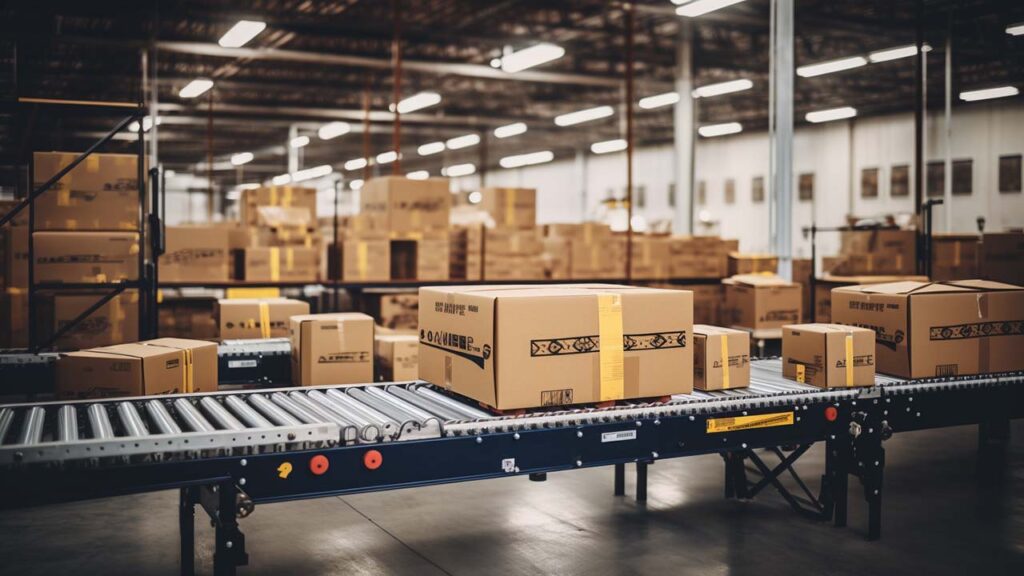
Real-World Success: How a 3PL Helped a Retailer Scale Peak Demand
A direct-to-consumer electronics brand struggled with peak season logistics. In previous years, they faced:
Stockouts during Cyber Monday, leading to a 20% revenue loss
Shipping delays, resulting in negative customer reviews
Costly storage overages, cutting into profits
After partnering with a 3PL, they implemented:
✅ Inventory distribution across 3 fulfillment centers, reducing stockouts by 85%
✅ Automated order processing, doubling their daily fulfillment capacity
✅ Carrier diversification, cutting shipping delays by 40%
As a result, the brand increased peak season revenue by 35% while improving customer experience.
The TikTok Shop Boom: By the Numbers
TikTok Shop is growing at an unprecedented rate:
- 1 Billion+ Monthly Active Users – A massive audience engaging with brands daily.
- Explosive Sales Growth – TikTok Shop is rapidly gaining traction, with billions in sales reported and projections showing continued expansion.
Influencer Marketing Powerhouse – Creators drive product discovery and conversions, giving brands unique exposure. Learn more about social commerce and fulfillment with FulfillMe.
Is Your Business Ready for Peak Season?
Surging demand should be an opportunity—not a challenge. With the right 3PL partner, businesses can scale operations, maintain fast fulfillment, and deliver exceptional customer experiences during peak seasons.
Ready to turn seasonal demand into a growth driver? Contact FulfillMe today to optimize your fulfillment strategy for success.

